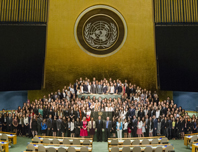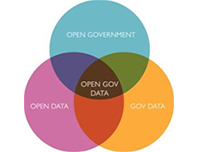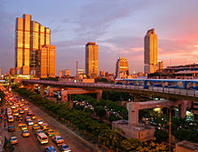 My name is Haodan, currently a Public Information intern in the Department of Economic and Social Affairs (DESA) at the United Nations. It was a long journey that brought me here, to this internship. It took a lot of reflecting, on who I am, where my passion lies in, what I am good at and how I can and want contribute to the world.
My name is Haodan, currently a Public Information intern in the Department of Economic and Social Affairs (DESA) at the United Nations. It was a long journey that brought me here, to this internship. It took a lot of reflecting, on who I am, where my passion lies in, what I am good at and how I can and want contribute to the world.
Since childhood, I have been dreaming of making the world a better place by eliminating inequality and injustice. Driven by this belief, I studied hard and accumulated experience in the public field. But the route to the UN truly began with a friend’s casual remark about an internship opportunity at the UN: “Why not try to realize your dream on a global level?” she said.
Enlightened by her words, I submitted the online application. After months of waiting, I eventually secured this precious opportunity and started this wonderful, unforgettable trip.
A hard day’s work, but great experience
DESA works closely with governments and stakeholders to help countries around the world meet their economic, social and environmental goals. Interns here are always busy and work in different areas. In our department, I am responsible for communication. Every day, when I arrive at the office at 9 am, the first thing to do is open different UN-related websites and social media platforms to browse world news or upcoming events related to the department’s work, then draft Facebook and Twitter posts based on them. Before leaving the office at 5 pm I publish or schedule all of the posts. Occasionally, I get a special assignment: supporting the communication team by writing stories on important UN events.
For me, every day is similar but different: I am doing the same work at the office, but the content I come across is different every day. The time I get a new topic to work on is also the time I start learning.
Sometimes interns get to attend different kinds of meetings hosted at the UN, from small-scale meetings within the division to large-scale international meetings involving all Member States. Melanie is an intern working on drought management in West Asia and North Africa. She particularly appreciates the opportunities of being present in the meetings. “Attending meetings is interesting. I could feel the ‘UN atmosphere’ and that was a great experience,” she said.
Intercultural environment, interesting network
Working in this unique environment, the network of UN interns is no longer limited to people from the same country. We become “international people” – this is not only reflected through us getting accustomed to different English accents, but also in building friendships with a group of cool young people from all over the world.
Sarabeth, a former intern for water management at DESA, is now a consultant. “I really enjoy working with people from different backgrounds. They are interesting. I want to make friends and stay connected with them.” When I asked why this is so important to her, she said: “I learned a lot from them, like culture, experience… everyone has their stories.”
An internship at DESA is not just an internship – in the process we gain experience that’s probably better than what you would gain in most organizations, and a network cooler than anywhere else.
More information: UN internship programme
 Opening up government data is fundamentally about more efficient use of public resources and improving service delivery for citizens. The effects of open data utilization are potentially far reaching for sustainable development with a positive impact on innovation, transparency, accountability, participatory governance and economic growth. Open Government Data (OGD) can help countries improve development programmes and track progress, prevent corruption and improve aid effectiveness. The benefits of open data and improved access to public information gain greater visibility and relevance today in the context of the 2030 Agenda for Sustainable Development.
Opening up government data is fundamentally about more efficient use of public resources and improving service delivery for citizens. The effects of open data utilization are potentially far reaching for sustainable development with a positive impact on innovation, transparency, accountability, participatory governance and economic growth. Open Government Data (OGD) can help countries improve development programmes and track progress, prevent corruption and improve aid effectiveness. The benefits of open data and improved access to public information gain greater visibility and relevance today in the context of the 2030 Agenda for Sustainable Development.
The development account project on “Strengthening of Capacities of Developing Countries to Provide Access to Information for Sustainable Development through Open Government Data (OGD)”, was approved in the summer of 2014, and is being implemented by DESA through its Division for Public Administration and Development Management (DPADM). It focuses on four developing countries: Bangladesh, Nepal, Panama and Uruguay. The project aims to support the needs for increased awareness of OGD requirements among government officials and other stakeholders while addressing capacities needed for developing action plans for implementing OGD initiatives. DPADM is working in close collaboration with relevant government agencies in host countries, as well as the UN regional commissions in Latin America and Caribbean (ECLAC), Asia and the Pacific (ESCAP), and UNDP country offices.
Through eight national and two regional level capacity building events, DPADM aims at assisting target countries with the development of policy frameworks and understanding demands of technical infrastructure required for implementing OGD initiatives, particularly in thematic areas relevant to the achievement of the sustainable development goals. It will strive to strengthen the open data community in each target country and stimulate south-south knowledge transfer on OGD by bringing together OGD-beginners with more OGD-advanced countries during regional workshops. The workshops are targeting high and mid-level government authorities, relevant public servants, as well as the broader OGD ecosystem and key stakeholders in each country. They offer opportunities for questions and answers after experts’ presentations to allow for a broader understanding on specific OGD topics.
The first national capacity development sensitization workshop on open data delivered within this project was held in Montevideo, Uruguay, on 12-14 May. It was followed by the second workshop in Panama City, Panama, on 28-30 July . The third event is scheduled for 23-25 August in Dhaka, Bangladesh, and the fourth one on 1-3 September in Kathmandu, Nepal.
After the first round of OGD sensitization workshops, DPADM will organize substantive trainings on key topics for OGD success in each of the 4 intervention countries. Dates for the workshops are confirmed for Uruguay (28 September – 2 October) and Panama (19-23 October), and will be soon discussed with the governments of Bangladesh and Nepal.
The success of this initiative is linked to partnership with UN national and regional offices as well as national partners. In particular, in Uruguay, DPADM is partnering with the Agencia para el Desarrollo del Gobierno de Gestión Electrónica y la Sociedad de la Información y del Conocimiento(AGESIC) of the Government of Uruguay.
In Panama, DPADM is partnering with the Autoridad Nacional de Transparencia y Asseso a la Información (ANTAI), in collaboration with the Autoridad Nacional para la Innovacion Gubernamental (AIG) of the Government of Panama.
In Bangladesh, DPADM is partnering with the Access to Information Programme of the Prime Minister’s office of the Government of Bangladesh
In Nepal, DPADM is partnering with the National Information Commission.
More information: Division for Public Administration and Development Management (DPADM)
 The 5th SDMX (Statistical Data and Metadata Exchange) Global Conference will be held from 28 to 30 September 2015 at the United Nations Conference Centre in Bangkok. This year’s conference is hosted jointly by the DESA’s Statistics Division (UNSD) and the United Nations Economic and Social Commission for Asia and the Pacific (UN ESCAP), with the theme “SDMX In Action”.
The 5th SDMX (Statistical Data and Metadata Exchange) Global Conference will be held from 28 to 30 September 2015 at the United Nations Conference Centre in Bangkok. This year’s conference is hosted jointly by the DESA’s Statistics Division (UNSD) and the United Nations Economic and Social Commission for Asia and the Pacific (UN ESCAP), with the theme “SDMX In Action”.
Topics for this year’s event include; SDMX and the global data revolution; Applying SDMX to improve statistical business processes; Governance of SDMX structures; SDMX infrastructure and tools; and SDMX and global standardisation.
For more information: UN Statistics Division
 My name is Haodan, currently a Public Information intern in the Department of Economic and Social Affairs (DESA) at the United Nations. It was a long journey that brought me here, to this internship. It took a lot of reflecting, on who I am, where my passion lies in, what I am good at and how I can and want contribute to the world.
My name is Haodan, currently a Public Information intern in the Department of Economic and Social Affairs (DESA) at the United Nations. It was a long journey that brought me here, to this internship. It took a lot of reflecting, on who I am, where my passion lies in, what I am good at and how I can and want contribute to the world.
 Opening up government data is fundamentally about more efficient use of public resources and improving service delivery for citizens. The effects of open data utilization are potentially far reaching for sustainable development with a positive impact on innovation, transparency, accountability, participatory governance and economic growth. Open Government Data (OGD) can help countries improve development programmes and track progress, prevent corruption and improve aid effectiveness. The benefits of open data and improved access to public information gain greater visibility and relevance today in the context of the 2030 Agenda for Sustainable Development.
Opening up government data is fundamentally about more efficient use of public resources and improving service delivery for citizens. The effects of open data utilization are potentially far reaching for sustainable development with a positive impact on innovation, transparency, accountability, participatory governance and economic growth. Open Government Data (OGD) can help countries improve development programmes and track progress, prevent corruption and improve aid effectiveness. The benefits of open data and improved access to public information gain greater visibility and relevance today in the context of the 2030 Agenda for Sustainable Development. The 5th SDMX (Statistical Data and Metadata Exchange) Global Conference will be held from 28 to 30 September 2015 at the United Nations Conference Centre in Bangkok. This year’s conference is hosted jointly by the DESA’s Statistics Division (UNSD) and the United Nations Economic and Social Commission for Asia and the Pacific (UN ESCAP), with the theme “SDMX In Action”.
The 5th SDMX (Statistical Data and Metadata Exchange) Global Conference will be held from 28 to 30 September 2015 at the United Nations Conference Centre in Bangkok. This year’s conference is hosted jointly by the DESA’s Statistics Division (UNSD) and the United Nations Economic and Social Commission for Asia and the Pacific (UN ESCAP), with the theme “SDMX In Action”.